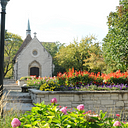Global Jesuits open up about possibility: Thomas d’Aquin Mbatna Taiwe
Mission Week Feature Series
Name: Thomas d’Aquin Mbatna Taiwe, S.J.
What is your country of origin?
Cameroon. My Jesuit province is French West Africa.
What is your Marquette Ministry focus?
I am here at Marquette to complete my Ph.D. in educational policy and leadership. While I am here primarily to study, I cannot stay without doing any priestly ministry. So I go to nearby parishes to say mass. But here at Marquette, I am a full-time student.
Which ministry is prioritized in your home country?
I’m not saying we don’t have priorities, but it’s difficult for us Jesuits to speak of one ministry taking precedence over another. Our focus is more on celebrating the sacraments: that’s why most of us joined the Society. In my province, we have many ministries, including high school and higher education facilities. We also run spiritual centers, social centers, and parishes. If we have a priority, it is the spiritual apostolate. This is because the Society asks all Jesuits to prioritize the Spiritual Exercises. This is our identity as Jesuits. The way we run schools is based on the dynamic of the Spiritual Exercises.
How has the Society’s international focus changed your mind to what is possible?
Even before joining the Society, we are told that we are joining an international organization. So I knew that having the opportunity to discover many things around the world would be part of my Jesuit life. You find the same ministries everywhere. The way they developed here in the U.S. might be different from the way they did this in my province because the circumstances are different. So I will talk about the deepening of the experiences rather than the differences. When I came to the U.S., I had already worked for a high school, so visiting high schools here gives me new ideas to go back and improve what we are doing. When I came here, I visited the nearby Milwaukee Rescue Mission, where they welcome homeless people, and I observed what they did. This gives me suggestions for when I go back home and talk with people who are working with street kids and the homeless. I’m really discovering other dimensions of the same ministries that we are doing, and that’s helped to improve ministries in my province.
How has being open to possible changes shifted the focus of your ministry?
The faith itself is the same, but when I came here, I met people who ministered differently. The adjustment came with being able to understand this and feel comfortable with it. To find my way in this culture that is foreign to me is already a gift and something that I gain with my contact in the international Society. When I go out and travel around my province — I’ve already visited 15 African countries — I understand my country and our own realities better. I can dialogue with my own people so we can improve many things we are doing. Anytime I leave, I come back and have something new to bring. I’m really happy with this exchange that benefits everything we do.
It’s also challenging to come home because when I return with different ideas, people don’t just welcome change. It can be hard for me to say, “O.K., this is how we are doing things here; maybe we should open ourselves to other methods because this is what others are doing and it seems to be working well.” When I succeed and bring about these small but difficult changes, I am very happy and the results speak for themselves.
